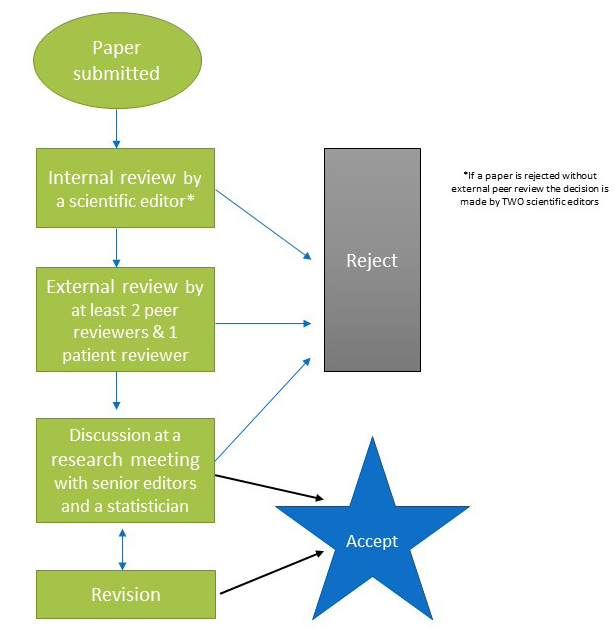Patient-Oriented Research Collection: Information for Peer Reviewers
Process for Considering Papers Submitted to the Collections

Types of Articles That May Be Submitted
CMAJ Open is an online open-access journal that welcomes high-quality research from all medical and health disciplines. Please consult our guidance for authors who may be interested in submitting articles to CMAJ Open's patient-oriented research (POR) collection to see what sort of articles you may be asked to review.
All articles for the POR collection need to involve patients in their planning and/or conduct, and describe exactly how patient partners were engaged.
According to the Canadian Institutes for Health Research, "Patient-oriented research refers to a continuum of research that engages patients as partners, focuses on patient-identified priorities and improves patient outcomes. This research, conducted by multidisciplinary teams in partnership with relevant stakeholders, aims to apply the knowledge generated to improve healthcare systems and practices." This is the definition we use when considering suitability of an article for the collection.
General Principles for Reviewing
Competing Interests
All reviewers, including patient reviewers, must declare any competing interests. That means you should let us know if:
-
An article has been co-written by a family member or person that you know well
-
You have been involved in the study you are being asked to review
-
You have any relationship with study funders
-
You stand to benefit in any way from the findings of the study
-
You are affiliated with a group that directly opposes an intervention or approach taken in the study
We recognize that many reviewers will have competing interests, but these do not necessarily prevent you from reviewing. You will have an opportunity to decline our invitation to review if you think that your competing interests preclude you from providing fair comment on the manuscript.
Confidentiality
All reviewers must keep confidential all information related to submitted articles, other reviewer reports, names of other reviewers and the contents of letters sent to the study authors.
Constructive Feedback
Reviewers should offer constructive feedback. Constructive reviews help authors by pointing out deficiencies in their study that can be improved upon. Constructive feedback forms part of a fair review process.
Final Decision
The editor is responsible for the final decision to accept, revise or reject a submission based on the comments made by the reviewers and input by at least 1 other editor along with a statistician, if applicable. A majority of 3 editors is required to accept or reject all manuscripts submitted to the journal.
Open Peer Review
Please note that CMAJ Open engages in open peer review, that is, all reviewer comments, author responses and previous versions are available along with the final published version of an article.
-
Even if an article is declined for publication, your comments and name will be available for other peer reviewers to see in the decision letter to the author. If you do not wish your comments to be made public, you should decline any request to review.
-
Please do not make any comments that you do not wish authors and readers to read (see below for exception).
Serious Concerns
There may be occasions when reviewers have serious concerns about a manuscript from a research or publication ethics standpoint, such as plagiarism or falsification of data. There is a text box for confidential comments to the editor as part of the review score sheet. This should onlybe filled in by reviewers when serious breaches in ethics are suspected. This information will be treated as confidential and investigated as required by the journal.
Specific Guidance for Patient Reviewers
You are expected to offer a lay opinion on the article and to consider its merits from a patient's perspective. You are not expected to be able to offer a detailed opinion on aspects of the statistical analysis or the scientific theory on which the article depends.
Please consider the following questions as you review the article:
✓ Do the researchers provide a clear description of how they engaged patients in their research?
Were patients engaged in various phases of the project? (e.g., Were patients involved in identification of priorities for what should be studied, in how the research should be done, in analyzing or making sense of the data or in disseminating the findings?)
Did patients contribute meaningfully to the research (rather than just as a participant, or as a token member of the research team)?
✓ Do the researchers describe how the engagement of patient partners added value (or did not add) to the results or outcomes of the study?
✓ Do the researchers describe any challenges with engaging patients in the study?
✓ Does the article include lessons learned from using a patient-oriented approach to research, so that others can learn from their experience?
✓ In your opinion, are the outcomes of the research ones that will make a real difference to patients, their families and their providers?

